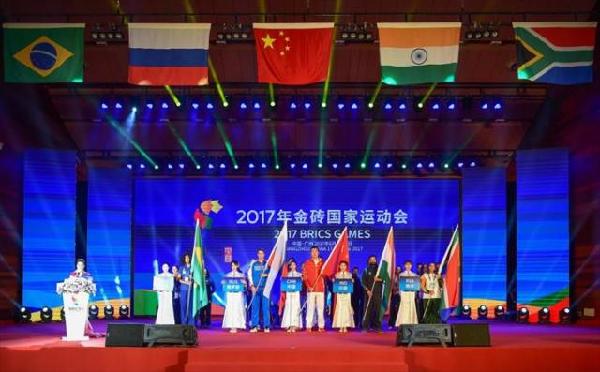The power of five: building a stronger partnership
- By Yu Lintao
 0 Comment(s)
0 Comment(s) Print
Print E-mail Beijing Review, September 3, 2017
E-mail Beijing Review, September 3, 2017
|
Athletes attend the opening ceremony of the BRICS Games on June 17 in Guangzhou, capital of south China's Guangdong Province. [Photo/Xinhua] |
Chinese Vice Commerce Minister Wang Shouwen said earlier this year that China will increase imports of agricultural products from Brazil, medical items from India and energy products from Russia. South African wine is also welcome in China.
In the first half of this year, China's imports from other BRICS countries were worth $70.16 billion, a 33-percent year-on-year increase. In the next five years, China is expected to import more than $8 trillion worth of goods. China will also launch a new annual international imports expo in 2018 to enable more foreign goods to enter.
Brazil is a good example of how being part of BRICS contributes to its economic momentum. Zhou Zhiwei, a researcher on Brazilian studies at the Chinese Academy of Social Sciences, pointed out how despite economic fluctuations, Brazil's economy has been growing. In 2016, it was among the top 10 shareholders in the International Monetary Fund (IMF). Zhou said Brazil's economic performance and international status underwent remarkable upgrading in the past decade partly because it is part of BRICS.
In the past 10 years, Brazil's trade growth with its BRICS peers has been much higher than with any other country. Even during the recent recession, Brazil's trade with them did not do badly at all, propping up the South American nation's foreign trade. In April, the IMF revised its 2018 GDP growth forecast for Brazil, increasing it to 1.7 percent from 1.5 percent.
Besides trade and the economy, BRICS is important for enhancing its members' international status. As Wang Lei, Executive Director of the BRICS Cooperation Center at Beijing Normal University, sees it, individually, "it is somewhat difficult for each BRICS country to make its voice heard in the West-dominated discourse. Their status will grow as their common interests coincide."
Chinese Foreign Minister Wang Yi suggests a greater global role for BRICS. "BRICS countries represent emerging economies," he said. "Over the years, their fortunes may have risen or fallen, and each faces challenges."
Representatives from BRICS ministries of health visit a pharmaceutical company in Tianjin on August 2 (XINHUA)
"As President Xi put it, BRICS countries are like five fingers, each with their own strength, but when we come together, we are a fist that can punch. When we stay united, we won't lose luster but will shine more brightly," Wang added.
At a seminar on BRICS in Beijing earlier this year, Georgy Zinoviev, Minister Counselor of the Russian Embassy in Beijing, said BRICS countries take concerted action on many important political and economic issues. "No country in the world can ignore our voice and our common will," he added.
Ram Madhav, National General Secretary of India's ruling Bharatiya Janata Party, voiced the thoughts of many of the participants at the BRICS Political Parties, Think Tanks and Civil Society Organizations' Forum that met in southeast China's Fuzhou in June. Without a doubt, he said, BRICS countries, as representatives of developing countries, should play a larger role in global governance in the 21st century.







Go to Forum >>0 Comment(s)